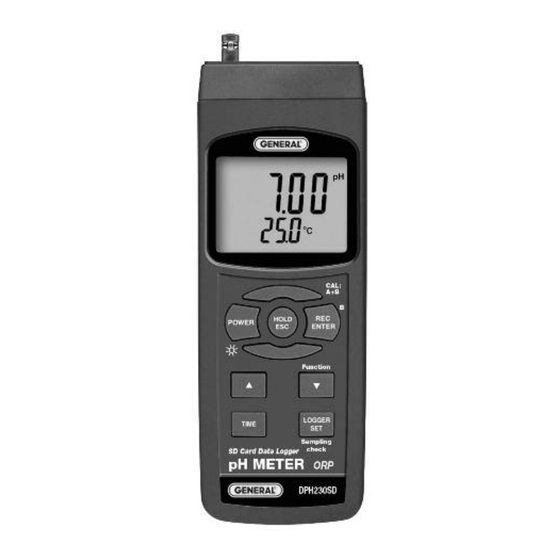
Table of Contents
Advertisement
Quick Links
Advertisement
Table of Contents

Summary of Contents for General DPH230SD
- Page 1 DPH230SD USER’S MANUAL pH METER WITH DATALOGGING SD CARD 99 Washington Street Melrose, MA 02176 Phone 781-665-1400 Toll Free 1-800-517-8431 Visit us at www.TestEquipmentDepot.com Please read this manual carefully and thoroughly before using this product.
-
Page 2: Table Of Contents
TABLE OF CONTENTS Introduction ....... . . 3 Key Features ......3 – 4 Operating Instructions . -
Page 3: Introduction
USB card reader. The data logs are stored on the card as files with the .xls extension, which can be opened by Microsoft’s Excel application. The DPH230SD has a backlit 2-1/2 in. diagonal display and is powered by six “AA” Alkaline batteries or an optional 9-VDC AC adapter. -
Page 4: Operating Instructions
• Powered by six “AA” batteries or optional 9V AC/DC adapter OPERATING INSTRUCTIONS WHAT’S IN THE CASE The DPH230SD comes fully assembled in a carrying case along with a 2 GB SD memory card and this user’s manual. Optional accessories available from General Tools & Instruments include pH electrodes, a probe that enables automatic temperature compensation (ATC) of pH electrodes, an ORP electrode, pH 4 and pH 7 buffer solutions, and a 9VDC adapter for a 110V power supply. -
Page 5: Setup
1-9 Kickstand 1-18 SD card socket SETUP 1. Choose the power source. Before using the DPH230SD, be sure it is powered by fresh batteries or an optional 9VDC AC adapter plugged into the bottom jack on its right side (callout 1-15). - Page 6 Press the REC/ENTER button to store the selection. If enabled, the power off function shuts off the DPH230SD after a period of inactivity of ten minutes. 7. Enable or disable the beeper. Once the auto power off function has been enabled or disabled, the display will show the word “yES”...
-
Page 7: Calibrating The Ph Electrode
9. Select the temperature unit. Once the format of decimal point divisions has been set and stored, the lower portion of the display will show the term “t-CF”. Press either the M or button to change the letter displayed at the right of the display to “C” (for Celsius units) or “F”... -
Page 8: Normal Operation
REC/ENTER button to calibrate the electrode for pH 10. 10. The pH electrode has now been calibrated once. To maximize measurement accuracy, General recommends rinsing the head of the electrode (and the head of the ATC temperature probe, if used) in distilled water and then repeating the above steps at least twice more. -
Page 9: Holding And Storing Measurements
The display will show the ORP of the solution, in mV. Whenever the DPH230SD is in measurement mode, you can turn off the backlight (which is on by default) by briefly pressing (but not holding) the POWER/ESC button. To reactivate the backlight, briefly press the button again. -
Page 10: Automatic Vs. Manual Datalogging
AUTOMATIC VS. MANUAL DATALOGGING The DPH230SD can automatically log data at a user-selected sampling period from 1 second to 9 hours. To view the sampling time for which the instrument was set up, press the LOGGER SET button (which has the words “Sampling check” stenciled below it) once. -
Page 11: Transferring Data From An Sd Card To A Computer
TRANSFERRING DATA FROM THE SD CARD TO A COMPUTER After automatic or manual datalogging of measurements, remove the SD card from the meter and plug it into your computer either directly (if it has an SD card slot) or through an SD card reader. - Page 12 Fig. 4. Typical Excel graphics-only screen Fig. 5. Typical Excel mixed data/graphics screen...
-
Page 13: Specifications
SPECIFICATIONS Embedded microcontroller Custom one-chip LSI device Display type Liquid-crystal with green backlight Display size 2.05 x 1.5 in. (52 x 38mm) Parameters measured pH, ORP Measurement range 0 to 14 for pH; -1999 mV to +1999 mV for ORP Measurement accuracy ±... -
Page 14: Maintenance & Troubleshooting Tips
Keep the pH and ORP electrodes and ATC temperature probe clean and protected from the elements when not in use. When the pH electrode is not being used, General recommends keeping its head inserted in the bottle of pH buffer solution. -
Page 15: Warranty Information
Acceptance of the exclusive repair and replacement remedies described herein is a condition of the contract for purchase of this product. In no event shall General be liable for any incidental, special, consequential or punitive damages, or for any cost, attorneys’ fees, expenses, or losses alleged to be a consequence of any damage due to failure of, or defect in any product including, but not limited to, any claims for loss of profits. - Page 16 99 Washington Street Melrose, MA 02176 Phone 781-665-1400 Toll Free 1-800-517-8431 Visit us at www.TestEquipmentDepot.com Specifications subject to change without notice ©2010 GENERAL TOOLS & INSTRUMENTS NOTICE - WE ARE NOT RESPONSIBLE FOR TYPOGRAPHICAL ERRORS. MAN#DPH230SD 12/07/10...














Need help?
Do you have a question about the DPH230SD and is the answer not in the manual?
Questions and answers